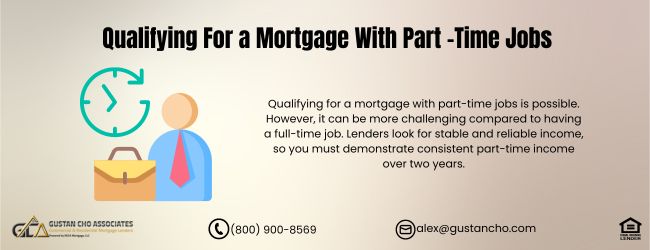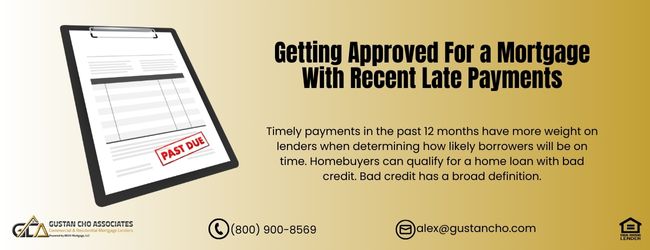Qualifying For a Mortgage With Part-Time Jobs

This article covers qualifying for mortgage with part-time jobs. The great recession and real estate and credit meltdown of 2008 was the worst economic disaster since the Great Depression where it affected millions of families. Whole business industries were wiped out and eliminated such as the sub-prime mortgage markets and the whole mortgage and real estate industry went through a total overhaul. Bankruptcy and Foreclosure soared to historic levels and thousands of business owners went out of business.
Millions of Americans lost their jobs, jobs where they had for decades, and felt secure. Homeowners saw their home equity evaporate before their eyes where their mortgage loan balance was greater than the value of their home.
Many could no longer afford their mortgage payments because of business loss, reduction of wages, or job loss where they were forced to file bankruptcy, go through foreclosure, go through a deed -in-lieu of foreclosure, or go through a short sale. With the election of a new President, Barack Obama, many new laws were passed and one of those laws was the health care reform act. This health care law mandates employers with 50 or more full-time employees to require health insurance for their employees.
Can Homebuyers Get a Mortgage With Part-Time Jobs
Qualifying for a mortgage with part-time jobs can be more challenging than with a full-time position. However, it’s certainly possible with the right preparation and understanding of what lenders are looking for. In this section, we will discuss some key considerations and steps to take. Lenders typically seek stable and reliable income when approving a mortgage. If you have part-time jobs, it’s crucial to demonstrate consistent income. A two-year history of part-time employment is often required to assure lenders that your part-time income is dependable. This history shows that you have steady employment and will likely continue earning at the same level. Speak With Our Loan Officer for Get A Mortgage With Part-Time Jobs
Mortgage With Part-Time Jobs: Total Income
Your total income from all part-time jobs must cover the mortgage payments, property taxes, homeowner’s insurance, and other associated costs. Lenders will use your gross income to calculate your debt-to-income ratio (DTI). To verify your income, you will need to provide pay stubs, W-2 forms, and possibly tax returns. Additional documentation may be necessary for those who are self-employed or work multiple part-time jobs.
Debt-to-Income Ratio (DTI)
DTI is a crucial factor in mortgage approvals. It measures your total monthly debt payments against your monthly gross income. Lenders typically prefer a DTI ratio of 43% or lower. If your DTI ratio is high, consider paying down debts before applying for a mortgage to improve your chances of approval.
How Credit Scores Impact Getting a Mortgage With Part-Time Jobs
A good credit score can compensate somewhat for the less predictable nature of part-time income. Higher credit scores also help you secure better mortgage terms. Ensure your credit history is in good standing by checking your credit reports and correcting any inaccuracies. A larger down payment can make your mortgage application more attractive to lenders. It reduces the loan-to-value ratio and the risk the lender takes on.
Employment Fields
If your part-time jobs are in the same field or industry, lenders may view this more favorably as it shows expertise and stability within a specific sector. If you have other sources of income, such as rental income or investments, make sure to document these as well, as they can help bolster your application. Consulting with a mortgage broker or lender can provide personalized advice and help you understand what specific lenders seek. Preparing thoroughly and presenting a complete picture of your financial stability and capacity to handle a mortgage can increase your chances of qualifying, even with part-time income.
Having Multiple Part-Time Jobs Versus One Full-Time Job
Finding a full-time job, which was rather easy to get in the past prior to Barack Obama, was next to impossible and is still very difficult to this day. Most employers hire two part-time employees rather than one full-time employee. This is because it is cheaper and saves the company money. Many Americans work multiple part-time jobs to make ends meet. Qualifying for mortgage with part-time jobs is allowed. However, there are restrictions and rules in qualifying for a mortgage with part-time jobs which we will cover in this mortgage blog article.
Mortgage With Part-Time Jobs Lending Guidelines
Qualifying for a mortgage with part-time jobs requires that the mortgage applicant has been with part-time employment for at least two years. Borrowers can have more than one part-time job. Multiple part-time jobs are allowed as long as borrowers have worked on each part-time job for at least two years. Part-time income will be averaged by the mortgage underwriter of the past two years.
If part-time income is declining from one year to another, then the mortgage underwriter has discretion on either using the most recent year’s part-time income (the lesser of the two years).
Or if the declining part-time income is significant, then the mortgage underwriter may not count the part-time income at all. Declining part-time income is not viewed favorably and the future earnings potential from the part-time job is questionable. Barack Obama, a community activist in the South Side of Chicago prior to becoming President of the United States, had no experience in business or had any management experience and meant well. However, it fired back to the citizens of this country. Click here to apply for a mortgage with multiple jobs
Mortgage With Part-Time Jobs Going From Part-Time To Full-Time Status
There are many cases where part-time employees become full-time employees. With situations where a part-time employee goes to full-time employee status, then the full-time income is analyzed and not averaged. The lender will need written verification of employment which is a form the employer needs to complete certifying that the employee is a full-time employee and the breakdown of the wages.
The new full-time income will be used for qualifying and the past two years part-time income will not be averaged. If the part-time went to a full-time employee as a salaried employee, then the annual salary will be used for income qualification purposes.
If the part-time employee went to full-time status working 40 hours per week, then the 40-hour hourly rate will be used for income qualification. The full-time employment status needs to likely continue for the next three years. 30 days of paycheck stubs will be required prior to closing on the mortgage loan.
Lender Overlays Mortgage Going Part-Time To Full-Time Status
If you are told that you do not qualify for a mortgage loan and need to wait two years if you went from part-time employee status to full-time employment status, then please call us at Gustan Cho Associates at 800-900-8569 or text us for a faster response. Or email us at gcho@gustancho.com.
This was a major disaster in the job market. This is because thousands of employers cut off full-time employees and made them part-time employees.
Many mortgage lenders have mortgage lender overlays with employment longevity where they will not accept anyone who was not on the same full-time job for at least two years. Mortgage lending guidelines do not require that a borrower be employed with the same employer for two years. This is up to the individual mortgage lender and is a mortgage lender overlay, which are additional guidelines imposed by individual lenders on top of the federal minimum mortgage lending requirements. Click here to get connect with our loan officer for Mortgage Loans
FAQs: Qualifying For a Mortgage With Part -Time Jobs
- Can I qualify for a mortgage with part-time jobs? Yes, qualifying for a mortgage with part-time jobs is possible. However, it can be more challenging compared to having a full-time job. Lenders look for stable and reliable income, so you must demonstrate consistent part-time income over two years.
- What documentation will I need to provide? To verify your income, you will need to provide pay stubs, W-2 forms, and possibly tax returns. Additional documentation may be necessary if you are self-employed or work multiple part-time jobs.
- How do lenders calculate my total income for mortgage approval? Lenders will use your gross income from all part-time jobs to calculate your debt-to-income ratio (DTI). Your total income must cover mortgage payments, property taxes, homeowner’s insurance, and other associated costs.
- What is the Debt-to-Income (DTI) ratio, and why is it important? DTI measures your total monthly debt payments against your monthly gross income. Lenders typically prefer a DTI ratio of 43% or lower. A high DTI ratio can reduce your chances of mortgage approval, so paying down debts before applying may be beneficial.
- How does my credit score impact my ability to get a mortgage with part-time jobs? A good credit score can help offset the less predictable nature of part-time income and secure better mortgage terms. Review your credit reports for accuracy and fix any mistakes to boost your credit score.
- Does the field of my part-time jobs matter to lenders? If your part-time jobs are in the same field or industry, lenders may view this more favorably as it indicates expertise and stability. This can enhance your application.
- Can having multiple part-time jobs affect my mortgage application? Multiple part-time jobs are acceptable, but you must have worked each job for at least two years. Lenders will average your part-time income over the past two years. If your part-time income has declined significantly, lenders may not count it.
- What happens if I transition from part-time to full-time employment? If you move from part-time to full-time employment, the lender will analyze your full-time income rather than averaging your past part-time income. You will need a written verification of employment and 30 days of paycheck stubs before closing on the mortgage loan.
- What are mortgage lender overlays? Mortgage lender overlays are additional guidelines individual lenders impose on top of the federal minimum mortgage lending requirements. For example, some lenders may require two years of employment with the same employer, which is stricter than federal guidelines.
- Who can I contact for more information or assistance? For personalized advice and assistance with your mortgage application, contact Gustan Cho Associates at 800-900-8569 or email gcho@gustancho.com.







Responses